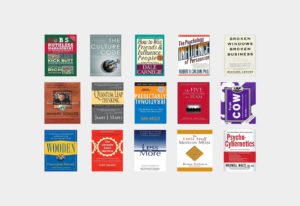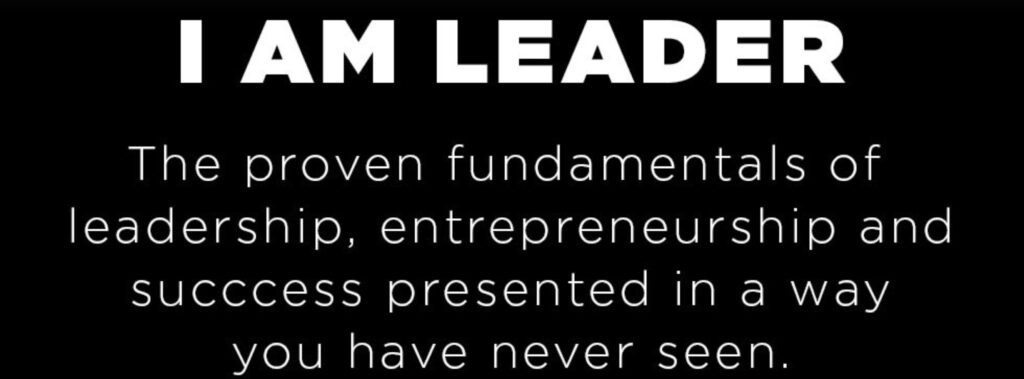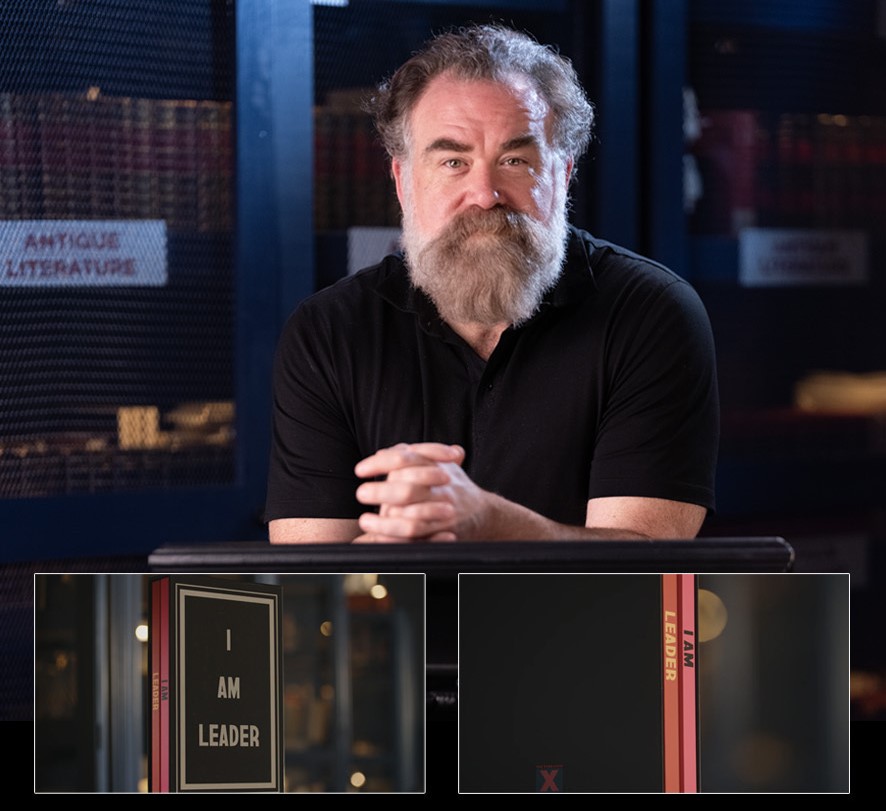We invited a guest that is going to be doing a workshop for our elite group coming up at our Top Dog event. And he’s also going to be speaking on stage at our Top Dog event! It is Andrew Bustamante, former covert CIA intelligence officer, decorated combat veteran, successful consultant to Fortune 10 companies, and just a wealth of knowledge and insight into human behavior.
Andrew Bustamante was very generous with his time in this interview, and we go into deep topics. You’re going to want to put your seatbelt on for this one– get ready because we talk about the secret recipe for leadership, how to invent and reinvent yourself, and how to make others feel accepted. So buckle up, because It’s one joycoaster of a ride!
Andrew Bustamante’s Tips For Understanding Human Nature– Leadership!
Leadership is a difficult subject to define because it encompasses so many different aspects and facets of humanity. It’s also so subjective so it varies between every individual. I just had to ask Andrew Bustamante for his thoughts on what he thinks leadership is, and I was impressed with his response.
What is your definition of leadership?
“My definition of leadership is when you can do something and people want to follow you, when they’re doing it, because they want to do it, then that’s leadership. And I don’t think that everybody can lead everybody else. We end up convincing ourselves that we’re a bad leader, if people don’t follow us. There’s lots of people out there that won’t follow you.”
“Because if, according to my definition, if you’re only leading the people who want to follow you, there’s plenty of people who don’t want to follow you. And they’re never going to see life through the same lens that you see life. They’re not going to see the battlefield and the opportunity. Nor will they see the objective that you see.”
“So it’s like the Spartan 300 story. Not every Spartan went up against the Persian Empire. It took 300. Those 300 were all volunteers working against the promise, they were working against the decision of the Senate at the time. They were led, because they wanted to be led by the person who was leading them. And that’s what led to their success. Granted, they perished, but their memory is their legacy has lived on and will live on forever.”
“So my definition of leadership is, if you can lead the people that want to follow you because they want to follow you, then you are a leader.”

What would you say is the most important ingredient in getting people to follow you?
“Being authentic, being genuine and sincere is what gives people trust to pursue the same thing that you’re pursuing. Because they believe that you and them are aligned. There’s a lot of human intelligence involved in spy work (not human intelligence like brains). And that entails secrets that come from people. A lot of the human intelligence operations around the world are based around fabricating authenticity, in order to capture the attention of somebody who has secrets. Then that loyalty that they develop to you because they follow you, because you’re their leader, is so powerful. This loyalty is so powerful that they end up compromising the secrets that they were trusted to keep.”
“But for you, you’re not being genuine, you’ve just created an artificial persona. And you’ve managed your authenticity, so that they believe you are who you present yourself to be. That’s what being undercover is really all about. It’s all about having the opportunity to fabricate a relationship, specifically to get intelligence so that you can keep Americans safe.”
“That’s the secret sauce– making it seem authentic and real. If it seems you’re disciplined, courageous, or strong, those things all work, too. But the real magic in what makes people follow them is someone who’s disciplined and strong and courageous authentically.”
How would charisma fit into that? And what are your thoughts on charisma?
“Charisma is an interesting thing. Because charisma is something that gives us familiarity. Charisma is candy. Charisma is sugar. Because if somebody is good at what they do, and they’re genuinely good at it, then you don’t need charisma. If someone is truly authentic, then you just like them.”
“Now when you have that authenticity, and charisma layers on top of it, that’s a powerhouse. But when you have somebody who has no business being a leader, but they also have charisma, that’s a dangerous combination. That’s diabetes in the making right there. All of that’s your soda pop and all of your sugar laced sauces and all this stuff that’s causing weight issues in America right now. That’s sugar, with no substance. The same thing happens in leadership, someone who has no substance and all charisma is a dangerous person.”
“How many friends do you have who are not charismatic? I’m sure you have plenty. Because you’re just a real person or a good person. They’re genuine. They see life the same way I see life. They care about the same things that I care about. They’re kind of a social hand grenade.”
Andrew Bustamante’s Tips For Understanding Human Nature– Reinvention!
If somebody isn’t getting the result they want, then the person they currently are isn’t the person to get that result. You fundamentally have to change the person to change the outcome. And a lot of people struggle with that idea– that if the outcome I’m getting isn’t what I want, then we have a hard time reinventing who we are. In the sense, there’s so many things attached to our identity that are so locked in, it’s hard to reinvent ourselves.
How I Invented & Reinvented Myself
So I was very introverted as a kid. Good at fixing businesses, but very hidden and behind the scenes. There was never a meeting where everybody got together and I was giving a rally speech. Even when I ended up running a big $300 million company, I would have my manager speak. If I ever had to give a speech, I would break out in hives.
And then I used to be in this group of these eight guys, it was kind of like a mastermind. And it was the greatest mastermind, because we met once a month, but you had an hour to talk about whatever you had going on in business. Everybody would give you their input or their ideas. There was a mix in the room of different people. One guy was really good with the internet, one guy was good with insurance and finance, and I even met my best friend to this day in that room.
But we were getting together this one time. They were talking about how he had done a presentation on tear sheets, which is an old advertising strategy. And he did a whole presentation to this room of 500 people about it. And I said to him, “Why are you doing that? I thought you were in a different industry.” And he said to me, “Why are you worried too much? Because I was just practicing public speaking.” And I said, “I hate public speaking.” And he looked at me and I went, “It’s not for me.” He looked right at me and went, “You better get over it. Because I don’t know anybody successful who can’t walk up in front of an audience and get them to believe what you want.” And in that moment, I decided that I was gonna get over it.
So I reinvented myself, and now people pay me to go speak. And so am I unhappy? No, I’m very happy when I go out and speak to a crowd. Plus, I affect them in a positive way. But I had to reinvent how I naturally speak or know how to put a lot of work into this. And I still put work into it, and I’m still trying to get better. Because inside, I know that if I don’t put in the work, then I’m gonna get caught. So I have to put in the work. And so that’s a reinvention of something that wasn’t natural for me. But I can affect more people in a positive way if I’m good at this thing.
Don’t you think that there are certain things, or there has to have been things that you maybe weren’t naturally good at, but you had to reinvent your frame of those things? That you then had to practice them in order to succeed, and it wasn’t making you unhappy or happy, but was just something necessary in the path?

So from the outside looking in, how would you explain to somebody how to reinvent themselves?
“There’s so much wisdom in what you just said. Have you ever heard people say, ‘the definition of insanity is doing the same thing over and over again.’ Yet, you’re exactly right, people see it, they get, but they’re not achieving a certain result. But they don’t want to do the work, or they’re afraid to even consider that there might be something fundamentally flawed with them as a person right now. So then they try to externalize it and find blame somewhere else.”
“It’s why everybody hates their boss. Because their boss is always the one holding them back. In reality, the boss isn’t the one holding you back, but the boss may be a contributing factor in the fact that you’re not hitting the result. But it’s not the only factor. And the boss is a manageable factor, once you’re willing to do the work on yourself first.”
“One of the things that the CIA teaches us is that we have these, we have these skills or pre-preferences. Predispositions that we’re born with that and we are not born with, but they are developed in us when we’re very young, and we don’t even realize they’re happening. For some people, they’re really good at problem solving. Or it’s a creative vision. And for others it’s a desire for learning. And we don’t value them, because they’re so natural to us.”
“When you don’t value the talent that you have, you tend to throw it away. But then what happens as you get older, that talent, even though you don’t value it, keeps coming back to you. And then you get it again. You’re good at speaking well, what’s that going to be? That doesn’t help me with algebra right now in the 10th grade. Then it comes back and it hits you in the chest. It hits you in the forehead, when you’re in 12th grade. And you’re like, ‘I’m good at speaking well, that doesn’t get me a date to prom.’ So you throw it away. You just keep throwing these talents away. But they keep coming back because they’re ingrained in you.”
CIA Secret– Remember To Leverage Your Natural Talents!
“That’s what you’re good at. You can’t throw it away. It’s wired into you. So the CIA teaches us that you have to trust those talents. They teach us to recognize those talents that are essentially your competitive advantage in the game of intelligence. Because the game of intelligence is just the game of life with higher stakes. You’re not just making friends to make friends. Now you’re making friends to steal secrets. You’re not just going for a walk to the grocery store, you’re going for a walk to the grocery store, if somebody’s following you. So that’s just higher stakes.”
“But you learn how to become the highest version of yourself when you embrace these talents that you’ve been devaluing your whole life. And then you start taking them on and owning them. So to get back to your point, fundamentally changing yourself often just starts with accepting what you’re good at. Instead of devaluing it, because you think everybody’s good at it, guess what, not everybody is good at everything.”
“Not everybody is good at the same thing you’re good at. So let yourself be good at it. That will fundamentally shift you, which will fundamentally shift the result. You’re good at two or three things, so own it. It’s going to change the result. We all worry that changing ourselves is a lot of work. But we are not realizing that sometimes it doesn’t take a lot of work at all to experiment with the way that you’re naturally wired. Just let it happen.”
What if the things that you’re good at don’t fit into the situation you’re in?
“I think that’s a valid concern. Because oftentimes, the situation that we’re in is a situation that we’ve been led to. Other people have driven us to the place that we’re at. Mom and dad drive you to college, and encourage you to get a degree that’s in the hard sciences, so you get a responsible job. I’m sure you remember how everybody had advice for you when you’re going to school. Or everybody had advice for you when you were getting your first job.”
“For my wife, it was her grandmother and her mother insisting that she get a degree in accounting. Become an accountant, you’ll always have a job. You’ll always have a good salary and always be in need. So there’s plenty of clients that I have now who come from financial backgrounds. They’re investors and they run investment portfolios, or they’re accountants or CFOs. And they’re miserable. But they did what other people told them to do.”
“Now they’re professionals, and really skilled in this job that they just don’t like. It’s not fulfilling. And it’s not challenging. It’s the same thing– literally, because numbers never change, week in and week out, day in and day out. So they can’t shift themselves to love where they are because it’s a completely different target. Where they actually want to be is somewhere else. When they shift who they are, they will get to where they want to be. Now, does that mean that they have to leave behind everything they built? Absolutely not.”
Andrew Bustamante’s Tips For Understanding Human Nature– Judging
We talked about charisma earlier in regards to leadership. Charisma is sugar coated on top of authenticity. But I wanted to ask how charisma contributes to connecting to people and making friends in the CIA scene.
Is charisma a tool that you pull out of the toolbox when you’re trying to befriend someone in the CIA?
“Absolutely, that’s something you pull out of the toolbox. And in large part, it’s because charisma is lacking in so many people. Because for many people out there, charisma, like sugar, is something they like to be around. But they themselves either lack the confidence, the social experience, or the comfort to exercise their own charisma.”
“So then what ends up happening is, especially in human intelligence operations, you go after a target to carve them out of their social realm. Part of the way that you increase the loyalty between people is by cutting them out of whatever social contexts they have. You take away those options, but you do it in a way where they don’t realize that’s what’s happening. The byproduct of that is they just become closer to you without other people to lean on. And as they become closer to you, then their own natural personality, their own natural charisma starts to show.”
“You want to see someone’s charisma. Ask them about their family, ask pet owners about their pets, ask parents about their kids, ask people about their favorite show, their favorite book, their favorite food. And boom, their charisma comes out there, smiles, gets easy, their eyebrows go up. They just start to talk. And they’ll talk, they’ll say the most amazing things that are truly charismatic, endearing, entertaining, and humorous. Because that’s something that they know well and they’re passionate about.”
“But it takes proximity to make someone consistently charismatic, unless they have the practice to turn it on or off like a light switch. So for us, we use it as sugar to carve them away from their existing friend groups and their networks. And as they get closer, we use their charisma as a way of reinforcing that they’re with the right person. Because what ends up happening is when somebody makes you feel good, you become loyal to that person. Since you start to feel like that person is the reason you feel good. It’s like sugar again. It’s the same.
“I’ve worked this in the opposite way too. When you’re around someone who doesn’t make you feel good, you start to think they’re the reason you don’t feel good. That’s why so many divorces happen. But when you’re around somebody who does make you feel good, or when somebody asks you questions or shows natural interest in you, that triggers dopamine in your cerebrum. It triggers a dopamine rush. It makes you feel like you’re special and makes you feel like you’re important. When you’re not with that person, you don’t get that rush. So then you come back to that person to get that rush again. And then boom, you’ve got an addiction, a connection, loyalty, or whatever you want to call it. But you’ve got power in that relationship.”
Would you say that the most important tool is acceptance?
Acceptance might be the most important part, because everybody wants to be accepted. And when you feel accepted, then you open up.
“Vulnerability is the word that we use. That’s the most important part of a human intelligence operation. Finding where someone else is vulnerable, and then being able to go into that space, and have them be comfortable with you in their vulnerable space.”
“There’s three lives that all people have. We all have a public life. We all have a private life. And we all have a secret life. With our public life, that’s the life that we all put a lot of effort into showing everybody. This is my public image of what I wear, how I do my hair, Instagram. That’s my public life. What I talk about, what I show people when I go down the street, and when I’m in a public setting. You don’t ever show weakness in your public life. Now your private life is a life that only a small circle knows.”
So what are the tools to move them from a close group of friends to the secret life?
I’d guess one would be telling them something that you shouldn’t tell them, so being vulnerable first.
“So it all ties to vulnerability. Exactly right. And then there’s different tools of volunteer shame, you can share shame. By the time you’ve walked somebody from public life to private life, and you’re starting to get close to secret life, you’re also able to assess, meaning you’re able to kind of read what they might have.”
“Have you ever been friends with somebody who you thought might have been gay, but they didn’t come out with it? That’s one of those areas where you can be like, if you really want to dig into a secret life for a long time, homosexuals had to keep that in their secret life. I’ve had friends that when I was in the Air Force Academy, that was at a time when it was still don’t ask, don’t tell, and you could get kicked out if you were gay, and all sorts of stuff. I had friends where I suspected they were homosexual.”
“And I knew that at any given moment, I had a close enough relationship that I could have gone up to them. I could have been like, ‘Look, man, I wonder if you’re just not into girls, or you’re into boys. And if you are, I still love you, man. You’re my best friend. I just want you to be happy. If there’s something I can do to make you happy. Just tell me tell me what that thing is.’”

So then how do you do that with a target out in the field?
Since now they’ve admitted that you’re now in their secret life.
“Because everybody has a secret life. Everybody has shame. You just need to find what that shame is. For some people that shame is the fact that they had an affair. Some people have shame with the fact that they’ve stolen money. For some people that shame is the fact that they are their closet alcoholics. For some people that shame is all sorts of different things.”
“And it’s not always things that you have to be shameful of. Some people are ashamed of the fact that they’re not in love with their current spouse. That’s not something to be ashamed of. But for them, they are maybe because of their religious background, maybe because of their parental upbringing. They’re ashamed of it, right. But if you can, if you can read a relationship, if you can read a person over weeks or months, watching them interact with their spouse, watching them interact in their private life and their public life. And then you come up and you think that you got it. If you dig into that vulnerability.”
“And you say, ‘Hey, sometimes I don’t like my wife, man. Like, I married her. I made a promise to a lot of people. But sometimes, I really don’t like her at all.’ And then they come back and they’re like, ‘Man, I totally understand. Tell me more.’ And then you’re breaking into that secret life. It’s not because they should be ashamed. It’s because they are ashamed. And if you can be vulnerable with somebody, and help them feel less shameful, you’re winning incredible loyalty from them.”
“Because guess what, there’s only one other person in the whole world, they can talk to you about it. And that’s something that we carry to bed. If anybody’s ever been in your secret life, you know exactly what I’m talking about. There’s something that’s heavy on your heart, you’re like, there’s only one person I could talk to about this. And then you think about them constantly. And when you get your chance to talk to them. It’s like coming home again. That’s what we simulate to create; it’s that artificial relationship. And espionage is to get people to tell us those secrets. It’s not healthy. But that is what we do.”
How Does Andrew Bustamante Stop Judging?
And maybe you have a skill set where you never really were judgmental. But I can tell you, that is not the case for me. The thing that I have learned and kind of figured out is that one of the biggest hindrances to connecting with people or leading people is judgment. And I’ve heard people say the saying if you judge and lose, in a sense, and that has to be true for what you’re doing. As you don’t want to judge, you just want to understand the truth.
Then the other part of that is judging and its relationship to patterns and scripts, in a sense that, like, if I go see a doctor, and he’s dressed in Miami, Dolphin hot shorts and a tank top that the doctor coats with the stethoscope. And so in a sense, part of the reason why you were successful in the CIA is because you fit into a certain thing. Then people, they weren’t challenged, or they weren’t judging you, you weren’t sticking out.
So a lot of times, if somebody is insecure and they come off really strong, we will meet their their aggression with aggression, instead of trying to understand it for what it is if somebody has trauma, we will, we will address the outcome of that trauma, but not the actual cause of the trauma, we’re not usually looking at the cause of why this person in front of me is acting this way. We just go right at the symptom. And that’s the judgment.
“So, when you talk about judgment, there’s, this is a super rich topic to talk about. Judgment is a conclusion. So let’s move from the word judgment, move into the word conclusion, because that’s what we’re doing when we judge. We’re reaching a conclusion based on limited information. This person is in Miami Dolphins hot shorts, and they’re not wearing a stethoscope. I have concluded they’re not a real doctor. That’s essentially what we’re doing. But then I get a little dopamine. But what you’re not realizing or what some people don’t realize is that you’re falling into a pattern of human survivalist behavior.”
“Remember, we talked about being cavemen. Cavemen wanted to go outside of their cave, look around, and in the distance they saw a boulder with fear on it. So then they’re like, ‘That’s a saber toothed tiger. I’m staying in my cave.’ It’s a survival instinct; those snap judgments, those snap conclusions are a tool that are outdated. We used to need them to keep ourselves alive. We don’t need them anymore. But we have evolved technologically and socially faster than we have evolved biologically. So now we have these judgments and snap judgments and conclusions working against us.”
“So what the CIA trains us to do is something called assessment. Assessment is essentially a never conclusive loop of information gathering. So you sit with somebody, and you’re taking on all the same information, but you’re not reaching any conclusions. This person is talking aggressively. This person seems angry, like their body language, is this their verbal language? Is this their tonality? Is this their word choices, whatever it might be? This is all assessment data. So instead of reaching the conclusion that they’re insecure, and pompous, or reaching the conclusion that they’re a jerk, and I need to defend myself, instead, we just continue looking for more information. You seem really upset about this. Can you tell me why? What about this makes you so frustrated? Because now people are gonna give more information.”
“The game of intelligence is a game of information superiority. You’ve heard of air superiority, mid lateral, or maritime superiority, ground superiority, weapons superiority, strategic superiority, this is information superiority, the person with the most information wins the battlefield. So we keep ourselves from reaching conclusions by creating constant assessments. Now, what you learned today, and what you assess the situation to be today can be totally different tomorrow, because between today and tomorrow, new information has arrived. So when you give yourself the space to make constant assessments, you’re constantly collecting information. The secondary effect of that is that the other person never feels judged.”
“They give you more information, and they have a positive experience with you, which makes them want to be around you, which creates loyalty to you. Just like we talked about earlier, because everybody else they’re talking to you. And guess what everybody else is doing, judging them and making them feel judged. The bet the superpower to judgment is twofold. One, when you don’t judge, the person you’re not judging naturally becomes more comfortable around you, and they build more trust in you.”
“The second thing is that the superpower is how you know they don’t get that anywhere else. Everybody else in their life is judging them. Their own mother’s judging them, their own dad is judging them. You’re the only person that’s giving them permission to just be themselves. And you’re showing natural interest and curiosity in them. It’s why you dominated in your job earlier, when you were saying you just had a natural curiosity about people. I bet that included people who walked in angry and people who were often happy you were still naturally curious. It’s hard for people to resist.”
Want More of Andrew Bustamante? Come To Top Dog 2022!
If you liked this topic of discussion, then make sure to get your tickets to Top Dog 2022 here! Andrew Bustamante will be a guest speaker at the event, alongside Dr. Anthony Klotz and Dog The Bounty Hunter! Can’t wait to see all of you there!










